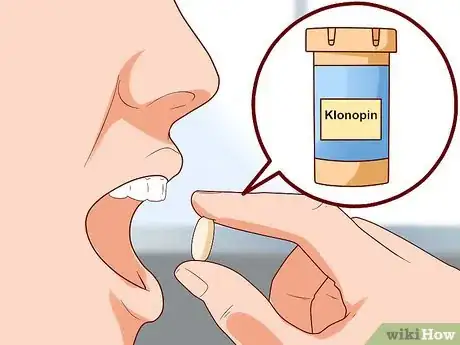This article was co-authored by Chris M. Matsko, MD. Dr. Chris M. Matsko is a retired physician based in Pittsburgh, Pennsylvania. With over 25 years of medical research experience, Dr. Matsko was awarded the Pittsburgh Cornell University Leadership Award for Excellence. He holds a BS in Nutritional Science from Cornell University and an MD from the Temple University School of Medicine in 2007. Dr. Matsko earned a Research Writing Certification from the American Medical Writers Association (AMWA) in 2016 and a Medical Writing & Editing Certification from the University of Chicago in 2017.
This article has been viewed 62,413 times.
Chronic Fatigue Syndrome, or CFS, is a debilitating condition which leaves the afflicted individual with an ongoing feeling of exhaustion. Persons with CFS may be unable to perform even mundane activities which under normal circumstances present no problem. There is no cure for CFS, and there are no medications developed specifically for the condition. Fortunately, there are a number of treatment options available which can alleviate the symptoms associated with CFS.
Steps
Seeking Support
-
1Work closely with your doctor or health care provider. Together, you should create an individualized program that works for you. Dealing with general practitioners can be difficult if they are not intimately familiar with CFS. CFS has a low diagnosis rate, but approximately 1 in 250 people are afflicted with it. Doctors without a thorough understanding of CFS may misdiagnose it as depression, general anxiety disorder, or a psychosomatic illness. Even where diagnosis is accurate, appropriate treatment may not follow unless the doctor has prior experience and knowledge of CFS.
- Work with your doctor to eliminate the possibility any other conditions that may have similar symptoms as CFS, such as thyroid issues.
- Your CFS treatment should engage a variety of therapists, counselors, and specialists in specific fields. Some of the symptoms that may require special attention include:
- Always discuss new and alternative therapies with your health care provider. Many so-called "quick cure" therapies may do more harm than good.[1]
-
2Try cognitive behavioral therapy (CBT). CBT has proven especially helpful in treating CFS. The goal of cognitive behavioral therapy is to help you better cope with CFS. By talking through the experience, giving it meaning, and discovering what may have triggered your CFS, you may be able to mitigate or better manage your CFS symptoms.
- It may be helpful to keep a diary to record your thoughts and experiences during the week before you go in to your CBT session. This way you can refer back to specific examples or situations in which you suffered a period of exhaustion, or in which you demonstrated greater acceptance of your CFS.
Advertisement -
3Join a support group or attend group therapy. Like CBT, group therapy offers the opportunity to share your experience with someone who cares. The difference is that you can listen to and learn from the experiences of others who are also suffering from CFS. This will help normalize the experience, and provide insight into other ways to deal with the illness. Group therapy can provide an individual with a sense of belonging and community.[2]
-
4Look for opportunities to educate. Many individuals are unaware of CFS or confused about its causes and symptoms. Open up to your friends and family about your condition. They can be an important source of support. Be patient but firm when you explain both what you're going through personally and what the medical community has concluded as a whole.
- One of the many myths about CFS is that it is psychosomatic, or an imagined disease caused by an individual's state of mind. Many people believe that individuals with CFS can simply “snap out of it” or can cure themselves by simply adjusting their attitude. Be on the lookout for this insidious myth, and let its adherents know that CFS is a serious condition with a firm basis in medical science.
Confronting Specific Symptoms
-
1Rebuild your ability to concentrate. A common characteristic of CFS is an inability to concentrate on verbal, written, or visual information. Following directions, multitasking, or performing an action which requires a series of steps may become difficult or impossible.[3] You can try either behavioral or medicinal treatments to rebuild your concentration levels.
- Behavioral concentration exercises encourage playing word puzzles or games. Crosswords, Scrabble, or similar games can make the process more fun.
- Getting an adequate amount of deep, restful sleep can help you focus.
-
2Try medication. There are many over-the-counter and prescription medications available which can reduce pain, cognitive problems, and other CFS symptoms.[4] Always use medication as directed and talk to your doctor if you experience any adverse side effects.
- Antidepressants have shown some promise in alleviating CFS. These medications can reduce pain and improve quality of sleep in addition to treating the depression that often accompanies CFS.[5]
- Klonopin, a prescription drug, can help concentration and remove the veil of “brain fog” often experienced by those with CFS. Ask your doctor if Klonopin or other tranquilizers might be helpful for you.
- Stimulants, like the drugs used to treat ADHD, may improve concentration in individuals experiencing CFS since the symptoms often overlap.
- Sleeping pills are frequently used as a CFS medication, since individuals suffering CFS find it difficult to sleep and feel less refreshed by sleep than they did before the onset of
- Medication might be part of your CFS treatment, but should not be the only part. Try alternative treatments in addition to medication.
-
3Relieve your pain. Pain can be the most debilitating aspect of CFS. Whether you experience headaches, sensitivity to being touched, or aches in your muscles and joints, treating your pain should be a top priority in any CFS treatment regimen.
- Readily available pain medicines like aspirin, ibuprofen, or acetaminophen can help manage your pain.
- Therapeutic massage can improve circulation and reduce pain.
- Deep breathing exercises can help block out pain. By breathing in a deliberate, focused way over a long period, pain and other phenomena can be reduced. In a seated position you're your eyes closed and both feet on the floor, try breathing in deeply, holding the breath, then exhaling slowly for thirty breaths.
- Heat treatments include hot water bottles, hot packs, warm baths, or heated mattress pads. These can help relax muscles and ease pain.
- Cold treatments include applying ice packs or bags of frozen vegetables to areas causing pain. Do not apply cold treatments for more than 15–20 minutes to a single location.
- Some chiropractors suggest that spinal manipulation can improve energy levels and reduce pain.
- Acupuncture may also have benefits depending on the severity of pain.
Changing Your Lifestyle
-
1Get physical. Aim for at least thirty minutes of light exercise each day. Swimming, bike-riding, or walking are all good options.[6] You can also try:
- Muscle relaxation techniques and deep breathing
- Stretching exercises
- Yoga
- Tai-chi
- Do not overexert yourself when exercising, but make sure your workout is vigorous enough that you gain the healthful benefits.
-
2Adjust your diet. A diet rich in fiber, whole grains, nuts, seeds, fruits, and vegetables may reduce CFS symptoms. Avoid refined foods, and foods high in sugar, salt, and saturated fat.
- Aim to eat five or more portions of fruits and vegetables each day.
- Modest portions of meat, soy, fish, or another source of protein should be included in two of the three daily meals.
- Incorporate starchy foods with a low glycemic index into your meals. These may include bread, cereal, potatoes, and rice.
- Try to eat several small portions more often in addition to the traditional three meals each day. Many CFS patients find a snack every three to four hours helps food cravings and improves energy.
- Take care not to overeat. CFS patients often believe they can boost their energy levels by consuming more at mealtime. Additionally, many medications prescribed for CFS require they be taken with food. These conditions can easily result in gaining excess weight.
- Drink water with every meal. Try to drink at least eight glasses each day.
- Limit your intake of caffeinated beverages. Caffeine is a stimulant which can disrupt biological rhythms and prevent a full night's sleep. Soda and coffee should be avoided.
- Alcohol depresses the body's immune system and adds an unnecessary processing load to the liver. In CFS patients, their immune systems and liver are already operating at less than optimal performance. Alcohol can push the already compromised CFS body to the breaking point, with toxic alcohol spilling into the bloodstream and even more dramatically depressed levels of energy.
-
3Pace yourself. Pacing is the act of dividing the total amount of work you have to do in a day into manageable bits. Do only your most pressing errands, or those which you have energy for. By pacing your daily schedule, you can intersperse periods of exertion with periods of rest, and avoid sudden physical or mental collapse.[7]
- When you feel worn out or near exhaustion, set aside your unfinished tasks and work on them another day.
- Schedule periods of downtime and rest for yourself as needed.
- After working for a week or so with a regular schedule, decide if you feel capable of adding additional tasks to your daily routine. Re-evaluate your energy level and schedule each week.
- Maintain a record of your energy expenditures throughout the day. Staying alert to changes in your energy level will not only help you pace yourself, but can also help you build a sense of accomplishment and chart your recovery in your fight against CFS.
- Take “energy shortcuts” where possible. Instead of washing the dishes by hand, run them through the dishwasher. Ride a bike instead of walking to your destination.
- Divide large tasks into manageable portions. Instead of taking on the task of cleaning the house, for example, try to clean the kitchen today, the living room tomorrow, and the bedroom the day after next.
-
4Take herbs and supplements. There are a number of herbs and supplements which may limit CFS. Speak with your doctor before trying supplements, as they can interact with other medications you may be taking. The supplement industry is unregulated, meaning there is no guarantee that you are getting what is advertised on the bottle, so ask your doctor or pharmacist for recommendations for reputable brands.
- Magnesium can be used to boost energy, but incorporate it slowly into your vitamin regimen; it has been known to cause diarrhea.
- Omega-3 fatty acids are found in nuts, seeds, and fish, and can reduce fatigue.
- NADH is a naturally occurring chemical which boosts energy. An NADH supplement can have the same energy-boosting effect when taken orally.
- DHEA is a hormone which aids the production of estrogen and testosterone, regulates adrenal gland levels, and helps the body deal with stress. Individuals with CFS tend to have low levels of DHEA (or DHEA sulfate), which leads to fatigue, brain fog, and low blood pressure. Medicinal DHEA supplements can correct low DHEA levels in cases of CFS. You will need a doctor's prescription to obtain DHEA.
- Melatonin is a hormone which regulates sleep. When the body prepares for sleep, serotonin levels decline and melatonin levels increase. In CFS patients, melatonin production is disrupted, but can be corrected with a melatonin prescription.
-
5Get plenty of sleep. Sleep deprivation and general exhaustion are the hallmarks of CFS. Getting enough – but not too much – sleep is an important starting point for recovery.[8]
- Aim for 8 to 10 hours of sleep each night.
- Do not consume caffeinated food or drink within three hours of your bedtime.
- Make sure your bed is comfortable and spacious enough for you.
- Set a regular sleeping schedule. Wake and go to bed at the same time each day.
- Try sleeping pills if you continue to struggle getting a full, restful night of sleep.
Warnings
- CFS often occurs in cycles, meaning that periods of severe disability may be balanced with periods of relative well-being. For this reason, CFS can be difficult to manage. If you believe you may be suffering from CFS, talk to your doctor.⧼thumbs_response⧽
- CFS can be a severe, life-changing illness. Some people with CFS may become homebound or bedridden. Do not underestimate the severity of your illness.⧼thumbs_response⧽
- There is no evidence that restrictive diets such as the anti-candida or paleo diet mitigate CFS.⧼thumbs_response⧽
References
- ↑ https://www.cdc.gov/me-cfs/treatment/index.html
- ↑ https://www.mayoclinic.org/diseases-conditions/chronic-fatigue-syndrome/diagnosis-treatment/drc-20360510
- ↑ https://www.cdc.gov/me-cfs/treatment/index.html
- ↑ https://www.cdc.gov/me-cfs/treatment/index.html
- ↑ http://www.mayoclinic.org/diseases-conditions/chronic-fatigue-syndrome/basics/treatment/con-20022009
- ↑ http://www.webmd.com/chronic-fatigue-syndrome/chronic-fatigue-syndrome-home-treatment
- ↑ https://www.webmd.com/chronic-fatigue-syndrome/tips-living-with-chronic-fatigue#1
- ↑ https://www.cdc.gov/me-cfs/treatment/index.html
About This Article
If you notice symptoms of chronic fatigue syndrome, like decreased energy, memory and concentration problems, anger, guilt, anxiety, or loss of independence, talk to your doctor so they can help you figure out what's going on. While your doctor may recommend medical treatments, there are also changes you can make to your lifestyle to help with chronic fatigue syndrome, like pacing your daily schedule so you don’t run out of energy. For example, focus on your most pressing errands each day instead of trying to fit in every task, which can help prevent a sudden crash. You should also try to exercise for at least 30 minutes every day to gradually build up your endurance. However, since exercise will tire you out, make sure you're getting between 8 and 10 hours of sleep every night to avoid exhaustion. For advice from our Medical co-author, like how to use supplements to treat chronic fatigue syndrome, keep reading.



























































Medical Disclaimer
The content of this article is not intended to be a substitute for professional medical advice, examination, diagnosis, or treatment. You should always contact your doctor or other qualified healthcare professional before starting, changing, or stopping any kind of health treatment.
Read More...